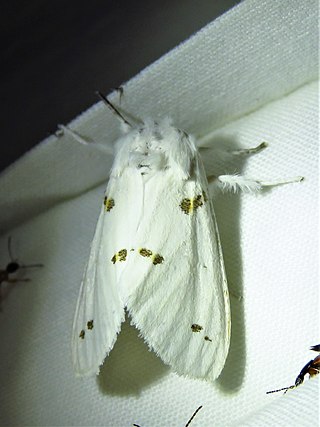
Aldisa is a genus of sea slugs, dorid nudibranchs, marine gastropod molluscs in the family Cadlinidae.

Stegania trimaculata, the Dorset cream wave, is a moth of the family Geometridae. It is found throughout Europe, mainly in Southern Europe, but its range has expanded in recent years.

The three-spot nudibranch, scientific name Aldisa trimaculata, is a species of sea slug, a dorid nudibranch, a marine gastropod mollusc in the family Cadlinidae.

Hesperilla is a genus of skipper butterflies in the family Hesperiidae, found throughout most of Australia.

Hesperilla trimaculata, the three spot skipper, is a butterfly of the family Hesperiidae. It is found in Australia.
Asperdaphne trimaculata is a species of sea snail, a marine gastropod mollusk in the family Raphitomidae.
Lebia trimaculata is a species of ground beetles in the Harpalinae subfamily that can be found in Austria, Bulgaria, Croatia, Cyprus, France, Greece, Hungary, Italy, Moldova, North Macedonia, Portugal, Romania, Russia, Slovakia, Switzerland, and Ukraine.

Euerythra trimaculata, the three-spotted specter, is a moth of the family Erebidae. It was described by Smith in 1888. It is found in the United States in central and southern Texas and the Florida Panhandle.
Euthyone trimaculata is a moth of the subfamily Arctiinae first described by E. Dukinfield Jones in 1908. It is found in Brazil.
Ptychovalva trimaculata is a moth in the family Gelechiidae. It was described by Anthonie Johannes Theodorus Janse in 1960. It is found in South Africa.
Epicedia trimaculata is a species of beetle in the family Cerambycidae. It was described by Louis Alexandre Auguste Chevrolat in 1856. It is known from Borneo, Malaysia and Java.
Anagelasta apicalis is a species of beetle in the family Cerambycidae. It was described by Pic in 1925. It is known from Laos, China and Vietnam.
Anagelasta grisea is a species of beetle in the family Cerambycidae. It was described by Stephan von Breuning in 1936. It is known from India.
Anagelasta lineifrons is a species of beetle in the family Cerambycidae. It was described by Gressitt in 1951. It is known from China.
Anagelasta nigromaculata is a species of beetle in the family Cerambycidae. It was described by Stephan von Breuning in 1938. It is known from India.
Anagelasta transversevittata is a species of beetle in the family Cerambycidae. It was described by Stephan von Breuning in 1964. It is known from Laos.
Cryphula trimaculata is a species of dirt-colored seed bug in the family Rhyparochromidae. It is found in Central America and North America.

Oxacis trimaculata is a species of false blister beetle in the family Oedemeridae. It is found in Central America and North America.
Delphacodes trimaculata is a species of delphacid planthopper in the family Delphacidae. It is found in North America.

Rudiloria trimaculata is a species of millipede in the family Xystodesmidae. It is found in the northeastern United States and southeastern Canada. A recently proposed common name for this species is Bob's Yellow and Black Millipede







